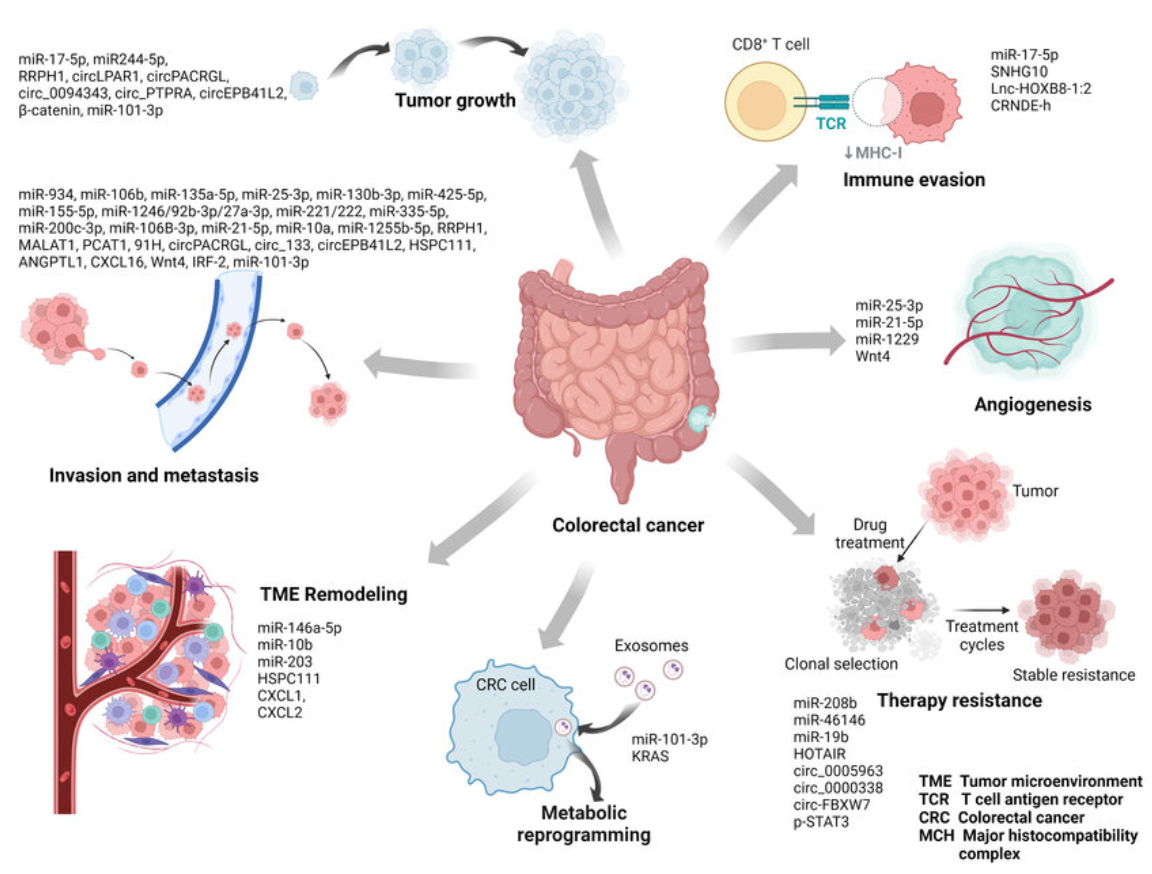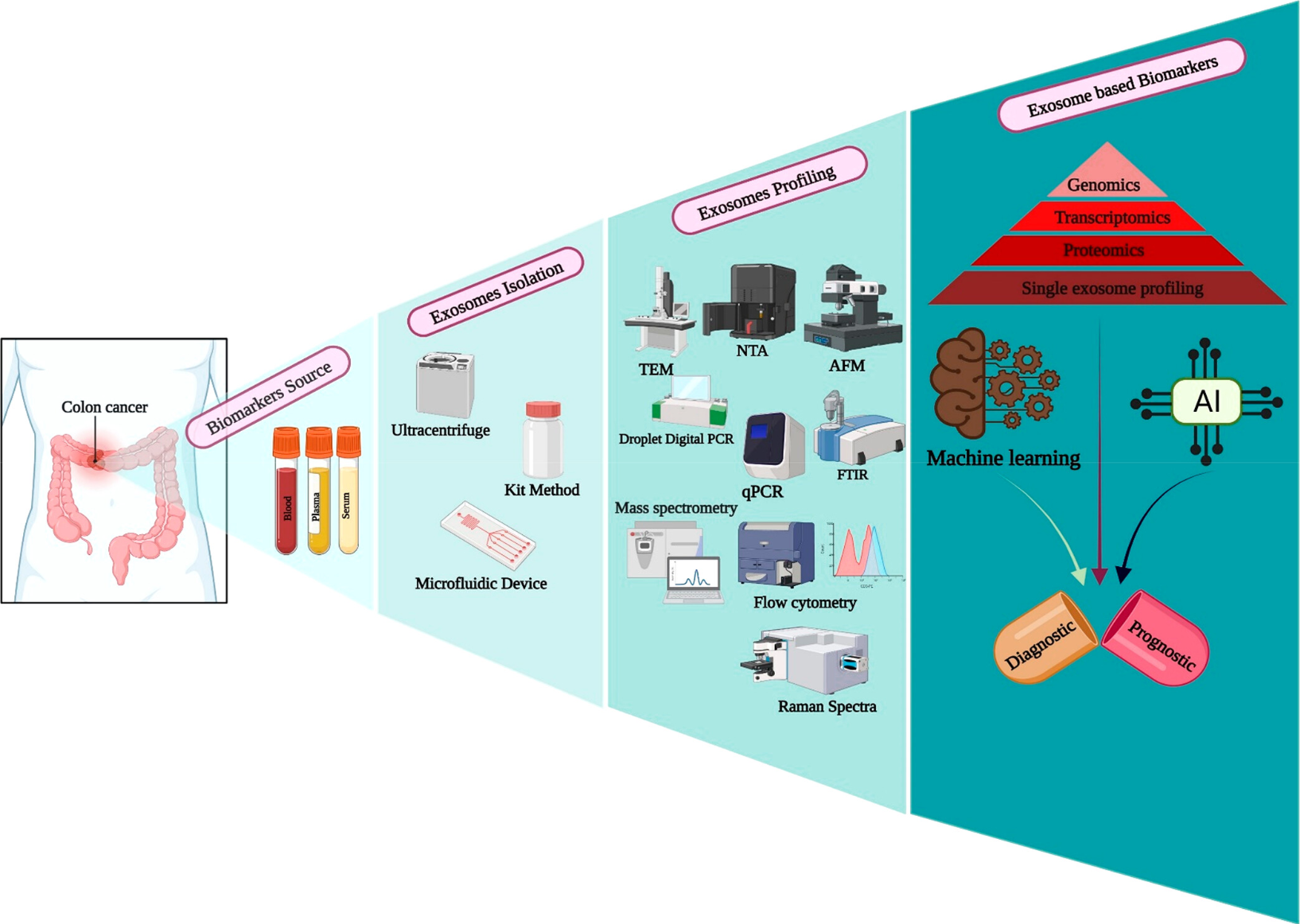Colorectal Cancer Exosome Research Service
- Ultracentrifugation
- Microfluidic Device
- Size exclusion chromatography (SEC)
- Polymer-based precipitation
- Immunoaffinity capture
- Nanoparticle tracking analysis (NTA)
- Transmission Electron Microscope (TEM)
- Western Blotting
- Flow cytometry
- High-resolution LC-MS/MS for proteomics , lipidomics, and metabolomics
- RNA sequencing for miRNAs and mRNAs profiling
- Fluorescent Labeling
- Bioluminescence Imaging (BLI)
- Magnetic Resonance Imaging (MRI)
- Computed Tomography (CT)
- Fluorescent labeling
- Genetic engineering
- Functional reporter systems
- Biomarker Discovery: Identification of exosomal RNAs, proteins, and lipids as non-invasive diagnostic, prognostic, or recurrence markers for colorectal cancer.
- Mechanistic Studies: Exploration of how CRC-derived exosomes mediate tumor progression, metastasis, immune modulation, and resistance to therapies.
- Therapeutic Target Validation: Evaluation of exosome-associated molecules as therapeutic targets or delivery vehicles in CRC treatment strategies.
- Tumor Microenvironment Analysis: Investigation of exosome-mediated communication between CRC cells and stromal, immune, or endothelial cells.
- Exosome-Based Drug Delivery: Assessment of engineered exosomes as carriers for targeted drug delivery in colorectal cancer models.
- Longitudinal Monitoring: Monitoring disease progression or treatment response through serial exosome profiling from patient-derived samples.
- Isolated Exosomes: ≥200 μg total protein or ≥100 μL in PBS
- Plasma/Serum: ≥2 mL per sample
- Cell Culture Supernatants: ≥5 mL per sample
- Stool: ≥ 1 g
- CRC Tissue (fresh or frozen): ≥ 20 mg
- Other Body Fluids: Please inquire for specific requirements
Colorectal cancer (CRC) represents one of the most prevalent and lethal malignancies globally, ranking third in incidence and second in cancer-related mortality. Despite improvements in screening and treatments, metastasis and therapy resistance continue to challenge outcomes. Exosomes, nanoscale extracellular vesicles actively secreted by tumor and stromal cells, have emerged as central mediators in the pathophysiology of CRC. By transporting oncogenic proteins, lipids, metabolites, and RNAs, CRC-derived exosomes facilitate intercellular signaling that modulates angiogenesis, epithelial–mesenchymal transition (EMT), immune suppression, and pre-metastatic niche formation. Moreover, CRC-derived exosomes are detectable in accessible biological fluids such as plasma, serum, and stool, making them promising candidates for non-invasive biomarkers in early diagnosis, disease monitoring, and therapeutic stratification.

Figure 1. Mechanism of Tumor-Derived Exosomes in Colorectal Cancer
Service at MtoZ Biolabs
To address these scientific and clinical needs, MtoZ Biolabs offers a robust Colorectal Cancer Exosome Research Service, integrating advanced isolation, high-resolution multi-omics, and functional assays. The Colorectal Cancer Exosome Research Service enables researchers to discover biomarkers, decode mechanisms, and explore translational applications.
MtoZ Biolabs has built an integrated platform tailored for colorectal cancer exosome research:
💠Exosome Isolation and Purification
💠Multi-Omics Analysis
💠Exosome Labeling and Tracking
💠Exosome Function Analysis (In Vitro & In Vivo)

Figure 2. Exosomes and Colon Cancer Biomarkers
Analysis Workflow
1. Sample Collection & Preprocessing
Collect plasma, serum, CRC tissue, conditioned media, or stool under clean and stable conditions.
2. Exosome Isolation & Purification
Employ ultracentrifugation, SEC, TFF, or immunoaffinity methods based on sample type and downstream needs.
3. Characterization & Validation
Confirm exosome quality via NTA (size, concentration), TEM (morphology), and marker profiling.
4. Cargo Profiling (Omics)
Proteomics, transcriptomics, lipidomics, and metabolomics using high-resolution platforms.
5. Labeling & Functional Testing
Tag exosomes for uptake/tracking; assess effects on CRC cell behavior and immunity in vitro and in vivo.
6. Data Analysis & Integration
Use bioinformatics pipelines to correlate cargo changes with functional outcomes and clinical relevance.
7. Custom Report
Provide comprehensive results, interpretations, and technical guidance for publication, validation, or follow-up experiments.
Service Advantages
☑️Advanced Exosome Profiling Capabilities
We integrate state-of-the-art platforms including MS-based proteomics, lipid/metabolite profiling, and NGS-based transcriptomics for comprehensive exosome characterization in colorectal cancer models.
☑️Customizable Service
From biomarker discovery to mechanistic exploration and therapeutic assessment, we provide customizable workflows aligned with your research objectives and sample types.
☑️Disease-Specific Expertise in Colorectal Cancer
Our scientific team possesses extensive experience in colorectal cancer biology and exosome research, enabling precise project design and data interpretation tailored to CRC pathophysiology.
☑️Strict Quality Control and Compliance
All experiments are conducted under validated protocols and stringent SOPs, ensuring data reproducibility, security, and compliance with ethical research standards.
Applications
Our colorectal cancer exosome research service supports a wide range of scientific and translational applications:
Sample Submission Suggestions
We accept the following sample types:
Samples should be stored at -80°C and shipped on dry ice. Avoid repeated freeze–thaw cycles.
*Please consult us for tailored collection and storage protocols to maximize data quality.
Deliverables
1. Comprehensive experimental details (materials, instruments, and methods)
2. Raw data
3. Processed omics data files
4. Quality control reports (NTA, Western blot, TEM images)
5. Functional assay results
6. Bioinformatics analysis
7. Customized report based on project requirements
MtoZ Biolabs' Colorectal Cancer Exosome Research Service empowers researchers to generate meaningful insights and accelerate translational outcomes. Contact us today to discuss your project and request a customized proposal!
Related Services
Pancreatic Cancer Exosome Research Service
Exosome Cargo Pre-loading Service
Exosome In Vitro Functional Research Services
How to order?







